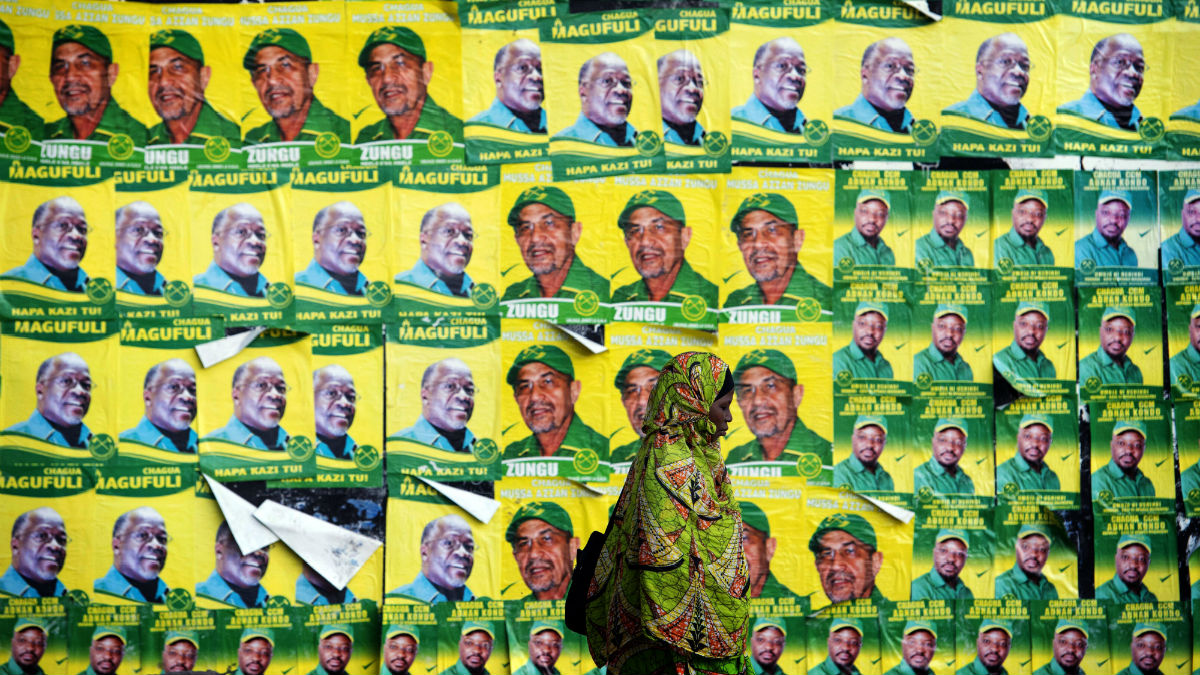Tanzania: men abandon wives who voted in elections
Activists warn that nearly 50 women have been divorced in Zanzibar in a 'significant threat to democracy'

A free daily email with the biggest news stories of the day – and the best features from TheWeek.com
You are now subscribed
Your newsletter sign-up was successful
Dozens of women in Zanzibar have been divorced or abandoned by their husbands after voting in Tanzania's recent elections.
Activists from the Zanzibar Female Lawyers Association (Zafela) and Tanzania Media Women Association (Tamwa) also confirmed that some women had not taken part in the poll due to threats from their husbands.
Mzuri Issa, the coordinator of Tamwa in the semi-autonomous Zanzibar archipelago, said 47 women were divorced after not following their husband's wishes, Reuters reports.
The Week
Escape your echo chamber. Get the facts behind the news, plus analysis from multiple perspectives.

Sign up for The Week's Free Newsletters
From our morning news briefing to a weekly Good News Newsletter, get the best of The Week delivered directly to your inbox.
From our morning news briefing to a weekly Good News Newsletter, get the best of The Week delivered directly to your inbox.
The women cast their ballots in the general election in October, in which the ruling Chama Cha Mapinduzi (CCM) party faced it first serious electoral challenge in decades.
Many of the women who were abandoned said they had voted for the incumbent party, while their husbands had favoured the opposition coalition known as Ukawa.
"I thought it was just normal and free in a democracy to differ in politics," one woman told the Tanzanian Daily News. "But unfortunately, my husband was adamant to the end and decided to divorce me. He has even decided not to bring basic needs to our young children."
Zafela's Saada Salum Issa has warned that the divorces were "really affecting democracy in the island as women's free choice is being compromised by their spouses' dictation."
A free daily email with the biggest news stories of the day – and the best features from TheWeek.com
However, there is very little the women are able to do to challenge the men's actions in Zanzibar, where 99 per cent of the population is Muslim, reports the BBC's Aboubakar Famou.
The nationwide elections were declared largely free and fair on the Tanzanian mainland, but voting was suspended in Zanzibar, which has its own president and parliament, due to outbreaks of violence and "gross violations".
A fresh presidential vote is due to be held in January or February next year.
-
 How Democrats are turning DOJ lemons into partisan lemonade
How Democrats are turning DOJ lemons into partisan lemonadeTODAY’S BIG QUESTION As the Trump administration continues to try — and fail — at indicting its political enemies, Democratic lawmakers have begun seizing the moment for themselves
-
 ICE’s new targets post-Minnesota retreat
ICE’s new targets post-Minnesota retreatIn the Spotlight Several cities are reportedly on ICE’s list for immigration crackdowns
-
 ‘Those rights don’t exist to protect criminals’
‘Those rights don’t exist to protect criminals’Instant Opinion Opinion, comment and editorials of the day
-
 Epstein files topple law CEO, roil UK government
Epstein files topple law CEO, roil UK governmentSpeed Read Peter Mandelson, Britain’s former ambassador to the US, is caught up in the scandal
-
 Iran and US prepare to meet after skirmishes
Iran and US prepare to meet after skirmishesSpeed Read The incident comes amid heightened tensions in the Middle East
-
 Israel retrieves final hostage’s body from Gaza
Israel retrieves final hostage’s body from GazaSpeed Read The 24-year-old police officer was killed during the initial Hamas attack
-
 China’s Xi targets top general in growing purge
China’s Xi targets top general in growing purgeSpeed Read Zhang Youxia is being investigated over ‘grave violations’ of the law
-
 Panama and Canada are negotiating over a crucial copper mine
Panama and Canada are negotiating over a crucial copper mineIn the Spotlight Panama is set to make a final decision on the mine this summer
-
 Why Greenland’s natural resources are nearly impossible to mine
Why Greenland’s natural resources are nearly impossible to mineThe Explainer The country’s natural landscape makes the task extremely difficult
-
 Iran cuts internet as protests escalate
Iran cuts internet as protests escalateSpeed Reada Government buildings across the country have been set on fire
-
 US nabs ‘shadow’ tanker claimed by Russia
US nabs ‘shadow’ tanker claimed by RussiaSpeed Read The ship was one of two vessels seized by the US military